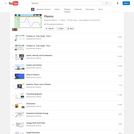
Series of videos that can be used in a Physics class created by Paul Anderson- Bozeman Science
- Subject:
- Physical Science
- Physics
- Material Type:
- Lecture
- Provider:
- Bozeman Science
- Date Added:
- 11/23/2016

Series of videos that can be used in a Physics class created by Paul Anderson- Bozeman Science

These thoroughly illustrated sheets make use of multiple representations and can be used for unit-end summaries in inquiry-based/modeling-style courses as well as for direct instruction in didactic courses.

This is a lesson plan for an activity about heart health and physical activity. Students will research, answer questions, and create a poster to present to the class about their type of physical activity.

In the electrical engineering, solid-state materials and the properties play an essential role. A thorough understanding of the physics of metals, insulators and semiconductor materials is essential for designing new electronic devices and circuits. After short introduction of the IC fabrication process, the course starts with the crystallography. This will be followed by the basic principle of the quantum mechanics, the sold-state physics, band-structure and the relation with electrical properties of the solid-state materials. When the material physics has been throughly understood, the physics of the semiconductor device follows quite naturally and can be understood quickly and efficiently. Study Goals: The student can 1) determine the crystal structure, the density of atoms and the Miller indices of a crystal, 2) apply Schrodinger's wave equation to various potential functions and derive a probability of finding electrons, 3) discuss the concept of energy band formation and difference of material properties in terms of the band, 4) derive the concentrations of electron and holes with a given temperature in terms of Fermi energy, and 5) can discuss drift, diffusion and scattering of carriers in a semiconductor under various temperature and impurity concentrations.
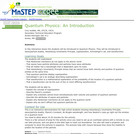
Introduction to Quantum Physics concepts with an activity demonstrating Heisenberg's Uncertainty Principle, wave/particle duality, Planck's Constant, de Broglie wavelength, and how Newton's Laws go right out the window on a quantum level.

Short Description:
Note: The second edition of this book was published September 2019. You can find it here: Physical Geology - 2nd Edition. Physical Geology is a comprehensive introductory text on the physical aspects of geology, including rocks and minerals, plate tectonics, earthquakes, volcanoes, glaciation, groundwater, streams, coasts, mass wasting, climate change, planetary geology and much more. It has a strong emphasis on examples from western Canada, especially British Columbia, and also includes a chapter devoted to the geological history of western Canada. The book is a collaboration of faculty from Earth Science departments at Universities and Colleges across British Columbia and elsewhere.
Long Description:
Physical Geology is a comprehensive introductory text on the physical aspects of geology, including rocks and minerals, plate tectonics, earthquakes, volcanoes, glaciation, groundwater, streams, coasts, mass wasting, climate change, planetary geology and much more. It has a strong emphasis on examples from western Canada, especially British Columbia, and also includes a chapter devoted to the geological history of western Canada. The book is a collaboration of faculty from Earth Science departments at Universities and Colleges across British Columbia and elsewhere.
Word Count: 175085
ISBN: 978-1-989623-71-8
(Note: This resource's metadata has been created automatically by reformatting and/or combining the information that the author initially provided as part of a bulk import process.)

The online educational resource Physics For Everyone is the scaffolding for a 3 contact hour, 3 credit general education course that conveys the relevance, beauty, and power of physics as a foundation of science and technology in the public interest.
This slide deck provides the outline for the semester-long course. Each week’s lecture topics, with key points to be covered, are highlighted in two slides, which also list writing prompts, problem-solving exercises, and labs. Also, we have curated a list of high-quality online video resources that students (and instructors) should use to help them learn (and teach) physics ideas and concepts using demonstrations, animations, and humor. Many of those videos are parts of larger series and programs, created by some of the most skilled and popular online presenters in the world; that means some of their content is commercially sponsored, but all the content is free to students and instructors. Finally, we have envisioned this course so that students are assessed with a large set of low-stakes, just-in-time-type assignments and laboratory exercises.
This work has been generously supported by New America’s PIT-UN (Public Interest Technology University Network) challenge grant program, and is licensed under a Creative Commons Attribution-Noncommercial-Share Alike 4.0 License.

PhysicalGeography.net is an educational web portal that focuses on a specific area knowledge known as Physical Geography. Physical Geography is a sub-discipline of two much larger fields of study - Geography and Earth Sciences.

This is a continuation of Fundamentals of Physics, I (PHYS 200), the introductory course on the principles and methods of physics for students who have good preparation in physics and mathematics. This course covers electricity, magnetism, optics and quantum mechanics.

Short Description:
Physical Geology is a comprehensive introductory text on the physical aspects of geology, including rocks and minerals, plate tectonics, earthquakes, volcanoes, glaciation, groundwater, streams, coasts, mass wasting, climate change, planetary geology and much more. It has a strong emphasis on examples from western Canada, especially British Columbia, and also includes a chapter devoted to the geological history of western Canada. The book is a collaboration of faculty from Earth Science departments at Universities and Colleges across British Columbia and elsewhere.
Long Description:
Physical Geology is a comprehensive introductory text on the physical aspects of geology, including rocks and minerals, plate tectonics, earthquakes, volcanoes, glaciation, groundwater, streams, coasts, mass wasting, climate change, planetary geology and much more. It has a strong emphasis on examples from western Canada, especially British Columbia, and also includes a chapter devoted to the geological history of western Canada. The book is a collaboration of faculty from Earth Science departments at Universities and Colleges across British Columbia and elsewhere.
Word Count: 183308
(Note: This resource's metadata has been created automatically by reformatting and/or combining the information that the author initially provided as part of a bulk import process.)
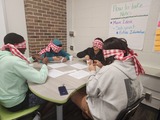
This is the first lesson in the PIESM Development Concepts, Physical Development. In this lesson, there is vocabulary, notes, and two activity stations that require observations. At the end, there is a reflective peice that requires use of student observation and analysis using developmental concepts learned.
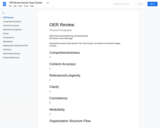
Review of Physical Geography: https://drive.google.com/open?id=1zpexvDtNw3GMFVRhGBrGhIbXwZo31QWNENTcaoexbss
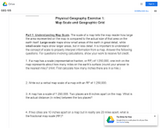
In-house assessments designed for use with a revised edition of Lumen Learning's Physical Geography textbook (https://courses.lumenlearning.com/chemeketa-geophysical/).
Catalog course description:
Focuses on the physical subsystems of the earth (atmosphere, biosphere, hydrosphere, and lithosphere), with emphasis on human-environment relations. Includes basic map skills, latitude/longitude, weather, climate, biogeography, volcanism, erosion, and desert landscapes.
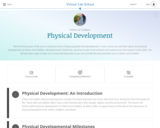
The preschool years are an important time of physical activity and development. In this course, you will learn about typical motor skill development and what to do if you are concerned about a child’s development. You will also learn how to plan indoor and outdoor experiences that promote physical development and support families and children as they pursue an active lifestyle.

This resource provides information around offering Sport(s) Officiating in High School Physical Education and available teaching resources.

This course is a continuation of 8.05 Quantum Physics II. It introduces some of the important model systems studied in contemporary physics, including two-dimensional electron systems, the fine structure of hydrogen, lasers, and particle scattering. The lectures and lecture notes for this course form the basis of Zwiebach’s textbook Mastering Quantum Mechanics published by MIT Press in April 2022.
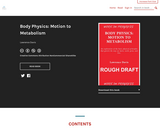
Short Description:
Body Physics sticks to the basic functioning of the human body, from motion to metabolism, as a common theme through which fundamental physics topics are introduced. Related practice, reinforcement and Lab activities are included. See the front matter for more details. Additional supplementary material, activities, and information can be found at: https://openoregon.pressbooks.pub/bpsupmat/. Order a print copy: http://www.lulu.com/content/paperback-book/body-physics-motion-to-metabolism/26081318
Long Description:
Body Physics sticks to the basic functioning of the human body, from motion to metabolism, as a common theme through which fundamental physics topics are introduced. Related practice, reinforcement and Lab activities are included. See the front matter for more details. Additional supplementary material, activities, and information can be found at: https://openoregon.pressbooks.pub/bpsupmat/. Specific topics covered in Body Physics are: scientific process, units, uncertainty, mass, density, weight, buoyant force, equilibrium, center of gravity, normal force, friction, torque, levers, mechanical advantage, tension, motion, impulse, momentum, the laws of motion, strength and elasticity of materials, work, kinetic and potential energy, power, thermal energy the first law of thermodynamics, efficiency, heat, entropy, and 2nd law of thermodynamics.
Order a print copy: http://www.lulu.com/content/paperback-book/body-physics-motion-to-metabolism/26081318
Word Count: 112607
ISBN: 978-1-63635-046-2
(Note: This resource's metadata has been created automatically by reformatting and/or combining the information that the author initially provided as part of a bulk import process.)

Adapted from Open Stax College Physics by the Department of Physics and Astronomy at Douglas College
Short Description:
This is a custom textbook for Physics 1207 Introductory General Physics II at Douglas College. This is the second semester of a non-calculus based course intended primarily for life science majors. It focuses on electricity, magnetism, optics and modern physics. This textbook is based on Open Stax College Physics.
Long Description:
.
Word Count: 344593
(Note: This resource's metadata has been created automatically by reformatting and/or combining the information that the author initially provided as part of a bulk import process.)

These lecture videos were made from home during the pandemic when most classes went online. They cover most of Physics-1 (mechanics), and a few chapters of physics-2. Subject: Physics Level: Community CollegeMaterial Type: LectureAuthor: Khalid BukhariDate Added: 09/17/2023